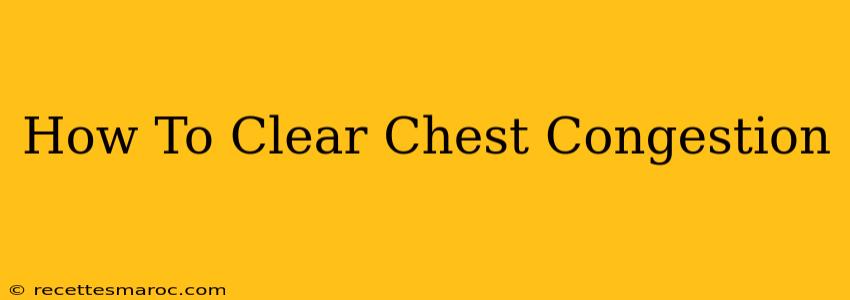Chest congestion, that uncomfortable feeling of tightness and pressure in your chest, can be caused by various factors, including the common cold, the flu, bronchitis, or allergies. While it's usually not serious, persistent congestion can be incredibly disruptive. This guide explores effective ways to clear chest congestion at home and when you should seek professional medical attention.
Understanding Chest Congestion
Before diving into remedies, it's crucial to understand what causes chest congestion. The most common culprits are:
- Upper Respiratory Infections (URIs): These infections, such as the common cold and the flu, often lead to mucus buildup in the airways, resulting in congestion.
- Bronchitis: This inflammation of the bronchial tubes can cause significant mucus production and chest tightness.
- Allergies: Seasonal allergies or reactions to irritants can trigger inflammation and mucus production, leading to congestion.
- Asthma: Asthma attacks can cause significant chest tightness and wheezing due to airway inflammation and constriction.
- Pneumonia: This lung infection can cause severe chest congestion, along with other symptoms like fever and shortness of breath. This requires immediate medical attention.
Effective Home Remedies for Chest Congestion
Many effective home remedies can help alleviate chest congestion. Remember, these are for symptom relief and may not cure the underlying cause.
Hydration is Key:
Drinking plenty of fluids, such as water, herbal tea (chamomile, ginger), and warm broth, helps thin the mucus, making it easier to cough up. Aim for at least 8 glasses of water per day.
Humidify the Air:
Dry air can worsen congestion. Using a humidifier or placing a bowl of hot water near a heat source can add moisture to the air, making it easier to breathe.
Saline Nasal Spray or Rinse:
These can help clear nasal passages, reducing congestion that can contribute to chest congestion. Follow the instructions on the product label carefully.
Rest and Sleep:
Your body needs rest to fight off infection. Getting enough sleep is crucial for recovery.
Elevate Your Head:
Sleeping with your head elevated on an extra pillow can help drain mucus from your lungs and alleviate nighttime congestion.
Over-the-Counter Medications:
Several over-the-counter medications can provide relief:
- Expectorants: These help loosen mucus and make it easier to cough up.
- Decongestants: These can temporarily relieve nasal congestion. Use these cautiously, as they can have side effects.
- Cough suppressants: These can help reduce coughing, especially if it's keeping you awake at night. Use with caution, as suppressing coughs entirely can sometimes be detrimental.
When to See a Doctor for Chest Congestion
While many cases of chest congestion resolve on their own, some situations require immediate medical attention:
- High fever (over 101°F or 38.3°C): This could indicate a more serious infection.
- Shortness of breath or difficulty breathing: This is a serious symptom and needs immediate attention.
- Chest pain: Chest pain accompanied by congestion warrants a doctor's visit.
- Whistling or wheezing sounds while breathing: This may suggest an asthma attack or other respiratory issue.
- Persistent congestion for more than 10 days: If your congestion doesn't improve after a week or ten days of home remedies, seek medical advice.
- Coughing up green or yellow mucus: This might indicate a bacterial infection requiring antibiotics.
Always consult a doctor before starting any new medication, especially if you have pre-existing health conditions. They can diagnose the underlying cause of your congestion and recommend the most appropriate treatment. Don't hesitate to seek professional medical help if you are concerned about your symptoms. Early diagnosis and treatment can often prevent complications.

